| Srl | Item |
| 1 |
ID:
163658
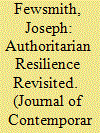

|
|
|
|
|
| Summary/Abstract |
The conventional wisdom in the period following Tiananmen was that the Chinese Communist Party (CCP) would fall victim to domestic pressures and international economic forces and follow the Soviet Union and other socialist systems onto the ‘dustbin of history.’ But it did not happen. In 2003, Andrew Nathan offered an explanation. The factionalism of the past was weakening in the face of growing professionalism and functional specialization. Political succession was increasingly bound by widely accepted norms, and the regime, though still authoritarian, was the beneficiary of feedback mechanisms that allowed a degree of political participation and provided information on contentious issues. In short, institutions were being created that strengthened the regime and extended its longevity.
|
|
|
|
|
|
|
|
|
|
|
|
|
|
|
|
| 2 |
ID:
181935
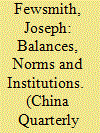

|
|
|
|
|
| Summary/Abstract |
In recent years, explanations of the Chinese Communist Party's longevity as a ruling party have focused on institutionalization. But a close look at the four leaders of China since 1978 reveal that institutions have remained weak. Of much greater importance have been balances that reflect the informal distribution of power and norms that express agreed-upon Party procedures. Of yet even greater importance have been the efforts of individual leaders to concentrate power in themselves through the appointment of protégés to critical positions. Such leaders also attempt to extend their influence beyond their terms in office through those protégés and their roles as “elders.” Thus, we see a tension between Party norms and the centralizing tendencies of Leninist systems in which the centralizing tendencies usually prevail. With Xi Jinping, we see a far greater personalization of power disrupting the norms and balances existing under previous leaders.
|
|
|
|
|
|
|
|
|
|
|
|
|
|
|
|
| 3 |
ID:
081863
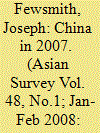

|
|
|
|
|
| Publication |
2008.
|
| Summary/Abstract |
In 2007 China was dominated by politics, specifically the preparations and negotiations heading into the Seventeenth Party Congress, which was held in late October. General Secretary Hu Jintao was successful in having his "scientific development concept" written into the Chinese Communist Party Constitution but was not allowed to name his own successor
|
|
|
|
|
|
|
|
|
|
|
|
|
|
|
|
| 4 |
ID:
046495
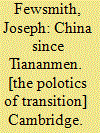

|
|
|
|
|
| Publication |
Cambridge, Cambridge University Press, 2001.
|
| Description |
xvii, 313p.
|
| Standard Number |
0521001056
|
|
|
|
|
|
|
|
|
|
|
|
Copies: C:1/I:0,R:0,Q:0
Circulation
| Accession# | Call# | Current Location | Status | Policy | Location |
| 045298 | 320.951/FEW 045298 | Main | On Shelf | General | |
|
|
|
|
| 5 |
ID:
115611
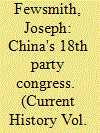

|
|
|
|
|
| Publication |
2012.
|
| Summary/Abstract |
Will the instinct to reinforce the rules of elite politics . . . undermine the leadership's ability to respond to the issues that Bo Xilai and the New Left aired?
|
|
|
|
|
|
|
|
|
|
|
|
|
|
|
|
| 6 |
ID:
050862
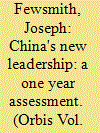

|
|
|
| 7 |
ID:
094682
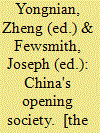

|
|
|
|
|
| Publication |
London, Routledge, 2008.
|
| Description |
ix, 244p.
|
| Standard Number |
9780415451765
|
|
|
|
|
|
|
|
|
|
|
|
Copies: C:1/I:0,R:0,Q:0
Circulation
| Accession# | Call# | Current Location | Status | Policy | Location |
| 054857 | 320.951/YON 054857 | Main | On Shelf | General | |
|
|
|
|
| 8 |
ID:
005607
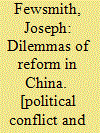

|
|
|
|
|
| Publication |
New York, M E Sharpe, 1994.
|
| Description |
xv,289p.
|
| Standard Number |
156324327X
|
|
|
|
|
|
|
|
|
|
|
|
Copies: C:1/I:0,R:0,Q:0
Circulation
| Accession# | Call# | Current Location | Status | Policy | Location |
| 036802 | 338.951/FEW 036802 | Main | On Shelf | General | |
|
|
|
|
| 9 |
ID:
130486
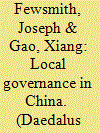

|
|
|
|
|
| Publication |
2014.
|
| Summary/Abstract |
China faces major challenges from social instability and general societal disaffection, which have continued to grow even as the economy has developed. In recent years, the Chinese government has tried to address such issues by diverting increasing resources to raising the income of villagers and providing social services to the urban and rural population alike. So why have "mass incidents"-public protests that sometimes turn violent-continued unabated? This article argues that the structure of central-local relations leads local governments to discount the interests of residents on the one hand, and distort central policies to the benefit of the local government on the other. The "party manages the cadres" principle, through which the central government exerts vertical control, prevents horizontal and bottom-up accountability, and thus ends up setting the interests of local cadres against those of local residents. The central government's interest in preserving its own power makes it reluctant to reform the central-local relationship, thus perpetuating crises.
|
|
|
|
|
|
|
|
|
|
|
|
|
|
|
|